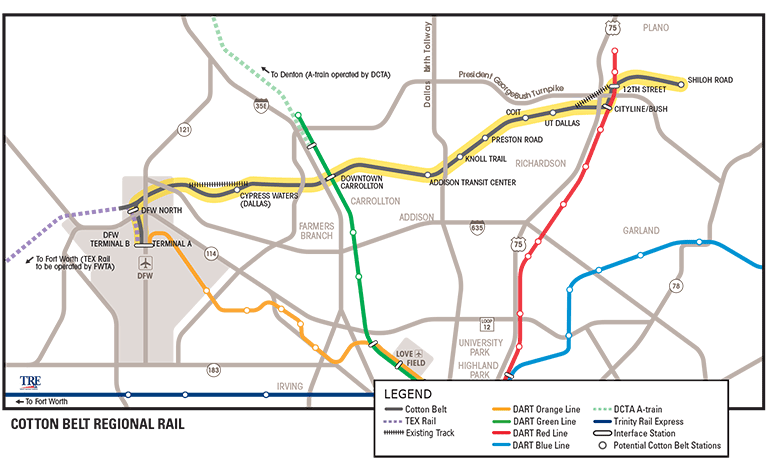As Collin County continues to grow, there becomes a need for more mass transit options for the region’s residents and employees. Plano is home to several headquarters and regional offices, including JCPenney, Frito Lay and Keurig Dr Pepper. In recent years, several corporations have chosen Frisco to relocate their headquarters or open second campuses. Such companies include Dallas Cowboys, PGA and Keurig Dr Peppers new headquarters, which will be followed by the closing of the Plano campus. While the forthcoming job opportunities seem worth the drive north of 635, there are, unfortunately, not a lot of public transportation options for prospective employees without a vehicle.
In Plano, there is a Dallas Area Rapid Transit shuttle bus that goes from Parker Road Station to the Legacy Business District. The shuttle stops by Legacy West, Frito Lay headquarters, JCPenney headquarters and Toyota USA’s Plano office. Albeit quick and convenient during traffic hours, the shuttle bus operates on a limited schedule from 6:00 a.m. to 9:00 a.m., and then again in the afternoon, from 3:51 p.m. to 6:51 p.m. There are also shuttles that go from Jack Hatchell Station in Plano to West Transfer Center in Dallas, as well as shuttles from West Transfer Center to Legacy West that operate on similar schedules. None of these express shuttles run on weekends.
Read more: DARTable Staycation: Summer Camps
As of now, there are no mass transit options that extend to Frisco. While Frisco’s new office campuses, like Keurig Dr Pepper and PGA Headquarters, aren’t slated to open for a few years, there are currently no set plans for more transit options to Frisco.
Some Collin County residents find DFW’s current transportation system enough of a challenge to navigate. For Richardson resident Jessica Yeatts, commuting from her home to her job in Dallas takes as long as two hours each way. Yeatts cites the transfer periods as the biggest hurdle during her daily commute to work.
“I feel like the wait times and the lack of weekend options makes it hard to get around,” Yeatts says. “Late night trains and buses need to increase.”
Even more challenging of a trek is that between Dallas County and Denton County, which is one Dallas resident Randall Hall used to make before eventually moving to Dallas. Hall still uses public transit to get from Dallas to Denton County when he visits his family in Flower Mound.
“It depends on the day and time,” Hall says, “but [it takes] an hour and a half on weekdays [to travel to Flower Mound from Dallas] and probably an hour additional on weekends.”
Although Hall mostly works out of his home, he says that he would probably not rely on any of DFW’s public transportation options if he were required to be present in an office setting outside of Dallas County.
In March, DART began replacing tracks between Mockingbird and Victory Stations in Dallas, resulting in those stations not serving passengers on Saturdays and Sundays. The replacements are projected for completion by September, however, mass transit passengers must take shuttles between the stations on weekends until then.
Additionally, improvement plans are underway for Denton County Transportation Authority to make commutes between counties less strenuous.
“This August, we plan to add four northbound and four southbound trains during mid-day which will allow for better connectivity to DART Green Line,” says Adrienne Hamilton, DCTA’s Senior Marketing and Communications Manager. “This will also lead to improved frequency during non-peak times.”
Hamilton notes that older passengers, passengers with disabilities and their caregivers are able to access programs offered by Collin County Transit, a partnership between DCTA, city of McKinney and McKinney Urban Transit District. According to Hamilton, Collin County Transit is a subsidized taxi voucher program that provides efficient transit options for participating MUTD cities including Celina, Lowry Crossing, McKinney, Melissa, Princeton and Prosper. Its programs include the Older Adult Program, the Individuals with Disabilities Program and the Low Income Transit Subsidy Program.
DCTA also provides curb-to-curb demand response transit service to eligible Frisco residents for trips within Frisco, McKinney, Allen as well as designated portions of Plano.
In the future, DART will expand upon its services in the form of the Cotton Belt Station, which will operate from 12th Street in downtown Plano to DFW Airport. The train is expected to meet the transportation needs of residents of Collin, Dallas and Denton Counties.

“DCTA is looking to extend its service to the south to connect to DART’s Cotton Belt line, which is expected to be complete in 2022,” Hamilton says. “The agency is also planning to extend north to Texas Woman’s University and possibly all the way to US 380. With the expansion of DCTA’s A-train to the DART Cotton Belt station, DCTA riders will be able to get to work in cities as far east as Plano or the airport via the agency’s A-train, saving them from having to burn gas or time in heavily congested roadways.”
Read more: DART secures $908M loan for Cotton Belt Corridor
Although there are plans for the expansion of DART’s and DCTA’s offerings, there are currently still no concrete plans for mass transit to cities like McKinney, Frisco and Allen. While DART and DCTA are able to provide transportation to various cities throughout the metroplex, passengers agree that the trains and buses don’t come often enough, nor do they extend far enough.




